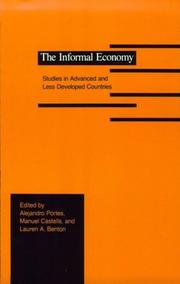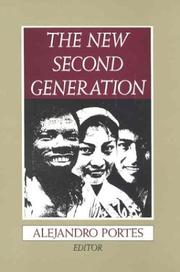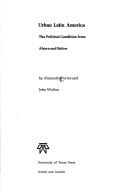| Listing 1 - 10 of 40 | << page >> |
Sort by
|

ISBN: 0801837359 Year: 1989 Publisher: Baltimore Johns Hopkins university press
Abstract | Keywords | Export | Availability | Bookmark
 Loading...
Loading...Choose an application
- Reference Manager
- EndNote
- RefWorks (Direct export to RefWorks)
Economic structure --- 338 <1-772> --- Informal sector (Economics) --- -Informal sector (Economics) --- -Hidden economy --- Parallel economy --- Second economy --- Shadow economy --- Subterranean economy --- Underground economy --- Artisans --- Economics --- Small business --- Economische situatie. Economische structuur van bepaalde landen en gebieden. Economische geografie. Economische produktie.economische produkten. Economische diensten--Onontwikkelde, onderontwikkelde gebieden --- Case studies --- Government policy --- -Case studies --- #A9205E --- Case studies. --- -Economische situatie. Economische structuur van bepaalde landen en gebieden. Economische geografie. Economische produktie.economische produkten. Economische diensten--Onontwikkelde, onderontwikkelde gebieden --- 338 <1-772> Economische situatie. Economische structuur van bepaalde landen en gebieden. Economische geografie. Economische produktie.economische produkten. Economische diensten--Onontwikkelde, onderontwikkelde gebieden --- Hidden economy --- Government policy&delete&

ISBN: 0871546841 0871546833 Year: 1996 Publisher: New York : Russell Sage Foundation,
Abstract | Keywords | Export | Availability | Bookmark
 Loading...
Loading...Choose an application
- Reference Manager
- EndNote
- RefWorks (Direct export to RefWorks)
Children of immigrants --- Ethnicity --- Immigrants --- Social adjustment --- Social conditions. --- United States --- Social conditions --- Emigration and immigration --- Enfants d'immigrés --- Immigrés --- Adaptation sociale --- Ethnicité --- États-Unis --- Émigration et immigration --- Conditions sociales
Book
ISBN: 0691142238 069114222X 9786612645051 1400835178 1282645056 9781400835171 9781282645059 9780691142227 9780691142234 6612645059 Year: 2010 Publisher: Princeton, NJ
Abstract | Keywords | Export | Availability | Bookmark
 Loading...
Loading...Choose an application
- Reference Manager
- EndNote
- RefWorks (Direct export to RefWorks)
The sociological study of economic activity has witnessed a significant resurgence. Recent texts have chronicled economic sociology's nineteenth-century origins while pointing to the importance of context and power in economic life, yet the field lacks a clear understanding of the role that concepts at different levels of abstraction play in its organization. Economic Sociology fills this critical gap by surveying the current state of the field while advancing a framework for further theoretical development. Alejandro Portes examines economic sociology's principal assumptions, key explanatory concepts, and selected research sites. He argues that economic activity is embedded in social and cultural relations, but also that power and the unintended consequences of rational purposive action must be factored in when seeking to explain or predict economic behavior. Drawing upon a wealth of examples, Portes identifies three strategic sites of research--the informal economy, ethnic enclaves, and transnational communities--and he eschews grand narratives in favor of mid-range theories that help us understand specific kinds of social action. The book shows how the meta-assumptions of economic sociology can be transformed, under certain conditions, into testable propositions, and puts forward a theoretical agenda aimed at moving the field out of its present impasse.
Economics - Sociological aspects. --- Economics -- Sociological aspects. --- Economics --- Sociology & Social History --- Social Change --- Social Sciences --- Sociological aspects --- Sociology. --- Sociological aspects. --- Social theory --- Economic sociology --- Socio-economics --- Socioeconomics --- Sociology of economics --- Social aspects --- Sociology --- Social sciences --- E-books
Book
ISBN: 9780691142227 9780691142234 Year: 2010 Publisher: Princeton, N.J. Princeton University Press
Abstract | Keywords | Export | Availability | Bookmark
 Loading...
Loading...Choose an application
- Reference Manager
- EndNote
- RefWorks (Direct export to RefWorks)
Economic sociology --- Economics --- 201 --- 330.1 --- AA / International- internationaal --- Socio-economics --- Socioeconomics --- Sociology of economics --- Sociology --- Sociological aspects --- Sociologie: algemeenheden --- Domein en natuur van de staathuishoudkunde --- Social aspects
Book
Year: 1995 Publisher: New York (N.Y.): Center for migration studies,
Abstract | Keywords | Export | Availability | Bookmark
 Loading...
Loading...Choose an application
- Reference Manager
- EndNote
- RefWorks (Direct export to RefWorks)
Book
ISBN: 128235521X 9786612355219 0520907310 9780520907317 6612355212 Year: 1985 Publisher: Berkeley University of California Press
Abstract | Keywords | Export | Availability | Bookmark
 Loading...
Loading...Choose an application
- Reference Manager
- EndNote
- RefWorks (Direct export to RefWorks)
Latin Journey details an eight-year study of Mexican and Cuban immigrants.
Cubans --- Mexicans --- Economic conditions. --- Social conditions.
Book
Year: 1995 Publisher: New York Russell Sage Foundation
Abstract | Keywords | Export | Availability | Bookmark
 Loading...
Loading...Choose an application
- Reference Manager
- EndNote
- RefWorks (Direct export to RefWorks)
Book
ISBN: 9781477302842 Year: 2021 Publisher: Austin
Abstract | Keywords | Export | Availability | Bookmark
 Loading...
Loading...Choose an application
- Reference Manager
- EndNote
- RefWorks (Direct export to RefWorks)

ISBN: 0520915542 0585249849 9780520915541 9780585249841 0520082176 0520089324 Year: 1993 Publisher: Berkeley University of California press
Abstract | Keywords | Export | Availability | Bookmark
 Loading...
Loading...Choose an application
- Reference Manager
- EndNote
- RefWorks (Direct export to RefWorks)
Winner, 1995 American Sociological Association Robert E. Park Award? Projecting fantasies of wealth and excess, Miami, "America's Riviera," occupies a unique place in our national imagination. Uncovering the hidden story of this dreamlike place, Portes and Stepick explore the transformations of Miami from a light-hearted tourist resort to a troubled, complex city.
Minorities --- Regions & Countries - Americas --- History & Archaeology --- United States Local History --- Ethnic minorities --- Foreign population --- Minority groups --- Persons --- Assimilation (Sociology) --- Discrimination --- Ethnic relations --- Majorities --- Plebiscite --- Race relations --- Segregation --- Miami (Fla.) --- City of Miami (Fla.) --- ميامي (Fla.) --- Mayāmī (Fla.) --- Mīyāmī (Fla.) --- Маями (Fla.) --- Mai︠a︡mi (Fla.) --- Μαϊάμι (Fla.) --- Miamo (Fla.) --- 마이애미 (Fla.) --- Maiaemi (Fla.) --- Майами (Fla.) --- מיאמי (Fla.) --- Miamia (Fla.) --- Majamis (Fla.) --- Мајами (Fla.) --- Majami (Fla.) --- マイアミ (Fla.) --- Маямі (Fla.) --- 迈阿密 (Fla.) --- Race relations. --- Ethnic relations. --- Social conditions. --- #SBIB:39A4 --- #SBIB:316.334.5U20 --- Toegepaste antropologie --- Sociologie van stad (buurt, wijk, community, stadsvernieuwing) --- Social conditions --- Florida

ISBN: 0292764278 Year: 1976 Publisher: Austin (Tex.) : University of Texas press,
Abstract | Keywords | Export | Availability | Bookmark
 Loading...
Loading...Choose an application
- Reference Manager
- EndNote
- RefWorks (Direct export to RefWorks)
| Listing 1 - 10 of 40 | << page >> |
Sort by
|

 Search
Search Feedback
Feedback About UniCat
About UniCat  Help
Help News
News